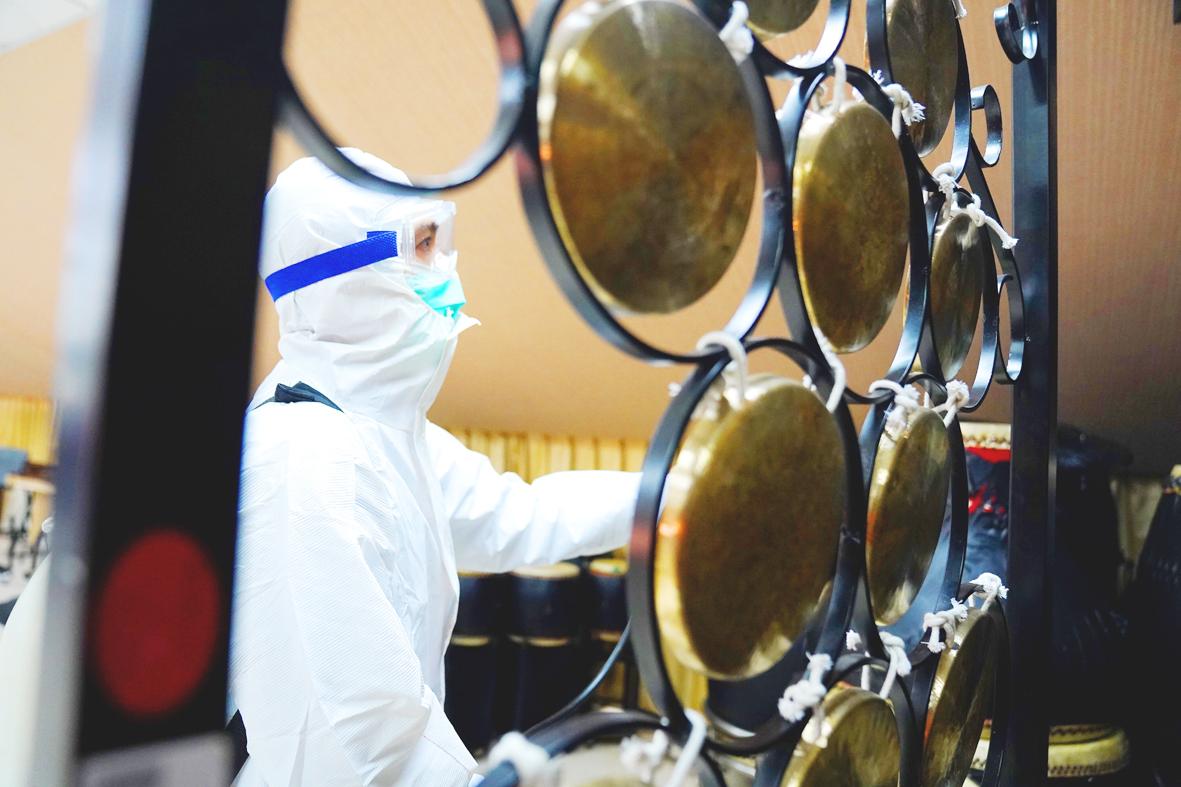At least nine of the nation’s universities have tightened campus access to prevent the spread of COVID-19.
They allow only faculty, administrative staff, students and visitors with permits to enter their campuses, university officials said.
The universities are: National Taiwan University, National Taiwan Normal University, National Chengchi University, Chinese Culture University, National Taipei University and Shih Hsin University in Taipei; Fu Jen Catholic University and Tamkang University in New Taipei City; and Yuan Ze University in Taoyuan.

Photo courtesy of Chinese Culture University
Separately yesterday, lawmakers called on the Ministry of Education to supervise schools more robustly to ensure that students have adequate e-learning resources after a number of high-school and university students were confirmed to have been infected.
Eighteen percent of students below high-school level in Kaohsiung have no Internet access, and the ratio is 15 percent in Taoyuan, Chinese Nationalist Party (KMT) Legislator Lin Yi-hua (林奕華) said during a question-and-answer session at the legislature’s Education and Culture Committee.
In areas outside the six special municipalities, 28 percent of students below high-school level in Taitung County have no Internet access, 27 percent in Chiayi County, 18 percent in Pingtung County and 17 percent in Hualien County, Lin said, citing a ministry report.
“I was extremely shocked when I saw the numbers,” she said.
K-12 Education Administration Director-General Peng Fu-yuan (彭富源) said that 32,000 15-day prepaid cards with Internet access have been prepared for economically disadvantaged students in a collaboration between the ministry and the nation’s five telecoms.
The ministry is also investigating the number of mobile devices available for people who need access to remote learning, Peng said, adding that as of yesterday, the ministry and education bureaus nationwide could offer offer 76,000 tablet computers.

CHANGING LANDSCAPE: Many of the part-time programs for educators were no longer needed, as many teachers obtain a graduate degree before joining the workforce, experts said Taiwanese universities this year canceled 86 programs, Ministry of Education data showed, with educators attributing the closures to the nation’s low birthrate as well as shifting trends. Fifty-three of the shuttered programs were part-time postgraduate degree programs, about 62 percent of the total, the most in the past five years, the data showed. National Taiwan Normal University (NTNU) discontinued the most part-time master’s programs, at 16: chemistry, life science, earth science, physics, fine arts, music, special education, health promotion and health education, educational psychology and counseling, education, design, Chinese as a second language, library and information sciences, mechatronics engineering, history, physical education

The Chinese military has boosted its capability to fight at a high tempo using the element of surprise and new technology, the Ministry of National Defense said in the Quadrennial Defense Review (QDR) published on Monday last week. The ministry highlighted Chinese People’s Liberation Army (PLA) developments showing significant changes in Beijing’s strategy for war on Taiwan. The PLA has made significant headway in building capabilities for all-weather, multi-domain intelligence, surveillance, operational control and a joint air-sea blockade against Taiwan’s lines of communication, it said. The PLA has also improved its capabilities in direct amphibious assault operations aimed at seizing strategically important beaches,

‘MALIGN PURPOSE’: Governments around the world conduct espionage operations, but China’s is different, as its ultimate goal is annexation, a think tank head said Taiwan is facing a growing existential threat from its own people spying for China, experts said, as the government seeks to toughen measures to stop Beijing’s infiltration efforts and deter Taiwanese turncoats. While Beijing and Taipei have been spying on each other for years, experts said that espionage posed a bigger threat to Taiwan due to the risk of a Chinese attack. Taiwan’s intelligence agency said China used “diverse channels and tactics” to infiltrate the nation’s military, government agencies and pro-China organizations. The main targets were retired and active members of the military, persuaded by money, blackmail or pro-China ideology to steal

The High Prosecutors’ Office yesterday withdrew an appeal against the acquittal of a former bank manager 22 years after his death, marking Taiwan’s first instance of prosecutors rendering posthumous justice to a wrongfully convicted defendant. Chu Ching-en (諸慶恩) — formerly a manager at the Taipei branch of BNP Paribas — was in 1999 accused by Weng Mao-chung (翁茂鍾), then-president of Chia Her Industrial Co, of forging a request for a fixed deposit of US$10 million by I-Hwa Industrial Co, a subsidiary of Chia Her, which was used as collateral. Chu was ruled not guilty in the first trial, but was found guilty